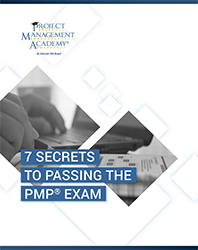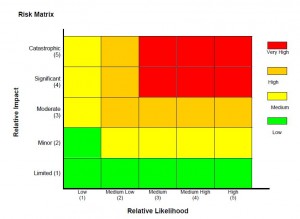
The field of project management is growing, and this growth in population will bring with it the collective knowledge that will define the methodologies, principles, and best practices of the project management field going forward.
Recently, Project Management Academy® sat down with three of its instructors to discuss their experience in project management, insights into the industry, and advice for those aspiring project managers. The first of this 3-part interview series highlights questions directly related to the Project Management Professional (PMP)® exam, a credential that each of these instructors have obtained and the very topic that they teach to their students. The subjects of this interview are:
- Gregg Richie, PMP, CNP, MCTS; 35 years of experience in construction, project and facilities management with 30 years of in-class instructor experience; author of Wiley Press' Official Microsoft Academic Course book on MS Project
- Jim Stewart, PMP, CSM; 20 years of experience in IT, financial, and pharmaceutical project management roles with 11 years of instructing experience
- Francis Mies, PMP; 18 years of experience in IT and telecommunications project management with over 15 years of instructor experience

PMA: Good afternoon. We'd like to thank you in advance for meeting with us today. We noted in your biographies that the three of you are PMP credential holders. So, to begin, tell us what factors led you to earn your PMP certification.
GR: After 28 years of managing projects, I felt it was time to have my ticket punched. I was discovering that no matter how much experience you had, if you did not possess the certification, no one would accept your claimed experience.
JS: I got my PMP credential in 2001 after having practiced project management for several years. I believe that my main motivation, like so many others, was to further my career. I figured that if there was a certification available for my profession, then I really ought to have it.
FM: It seemed to be rapidly becoming the de facto standard for employment, so naturally I was inclined to sit for the exam.
PMA: And what methods did you use to study for the exam?

All PMP certification testing is done through Pearson VUE testing centers, in facilities just like this!
GR: I took two PMP prep courses - one through Villanova University as part of my Master's Certificate and one through the local chapter. Ironically, I failed my first exam. I studied for 22 straight evenings after I failed, and focused on the PMI way of doing things. Since I had been doing most of the processes listed in the A Guide to the Project Management Body of Knowledge (PMBOK® Guide) as a normal part of my job, (network diagrams, estimates, risks, etc.) I focused more on the softer skills; the viewpoint of how PMI sees project management.
JS: I took a two-day class from a training organization in Boston. After class, I didn't study right away due to the holidays. But once I got going, I studied for about 6 weeks, 6 nights per week. I had good study materials but only about 450 questions which I did over and over again.
FM: I took a crash course and then self-studied for several weeks.
PMA: That's very interesting and, of course, we're glad to hear you all eventually passed your exam. In actually sitting for the PMP exam, what aspect of the test did you find most challenging?
GR: Leaving my experience at the door was the most difficult part by far. The exam tests from the setting of what I have copyrighted and coined "The Blue-Skied World of PMI"© where you assume you have good OPA and EEF, a contract administrator, all communication is open, honest and shared; a world where you can tell your boss "No" - and keep your job!
JS: The very first questions I got were not easily recognizable. It's been a while since I took the exam but I do remember it took me a few questions until I started to feel comfortable with the material. So for me I'd say it was just getting into it and getting past those initial 5 - 10 questions.
FM: The most difficult part, for me, was that the wording on the exam led to the possibility of more than one plausible answer. It's important to realize that reading and writing proficiency play a big part in this test.
PMA: That's certainly some insightful advice for students preparing to sit for the exam. Thanks for that. We were also wondering: what sort of real-world applications have you noticed from your certification training?
JS: I think that from a professional perspective they are significant. In addition to a career boost, you learn more about how to use certain tools and techniques such as work breakdown structure or risk management. I truly believe that a careful study of the PMBOK® Guide rewards itself in the ability to run much more successful projects. I try to convince students that they should not just shelve the PMBOK® Guide after getting their PMP certification but actively use it for the betterment of their projects. That's the PMBOK® Guide's real purpose.
GR: Even though the exam is more theory and terminology than real world, there are many great tools, tips, techniques, and processes that a student can put to use in their everyday PM life after the course. For example, many of my students comment that the risk register and the impact rating table are great tools for recording and assessing risk. Also, I feel that if the instructor can clearly separate the exam prep from real-world, they can give their own examples of where the PMI processes work in projects all the time.
PMA: It's exciting to hear that the PMBOK® Guide doesn't just teach with the goal of completing an exam, but actually has some practical application. We'd like to change gears a little now and ask: What other professional certifications have you acquired or are interested in pursuing?
FM: I do have another certification now through the American Guild of Court Videographers [AGCV] and I have let one slip from the Building Industry Consulting Service International [BICSI]. I'm not looking to pursue any other certifications as I have moved into the later stages of my working life.
JS: In addition to the PMP credential, I also have a Scrum Master certification. I thought it would be advantageous to know something about Agile in case I was ever in that environment or needed to advise a customer about it. I am also currently toying with the idea of getting Six Sigma Green Belt certification. That is a long shot but I am increasingly involved in best practices and Six Sigma speaks to that. And then possibly Microsoft Project certification.
GR: I am a Certified Networking Professional [CNP], but that does not mean I know anything about computers! I teach people how to use the skill of networking to improve their business relationships to become a better PM. I am also a Microsoft Certified Technology Specialist [MCTS] for Microsoft Project.
PMA: Great answers. You three certainly have a wealth of experience that your students can draw from. Going a little broader now, can you tell us what other activities you engage in to improve your overall skill set?
GR: I own and operate a consulting firm, focusing on the implementation of MS Project for small to mid-sized organizations - this of course requires me to stay current. I also read periodicals on project management (mostly from PMI) and write books on PM related practices. As for improving my teaching skills - I review websites, books, and other information on teaching tactics and how to be a better instructor.
JS: I also do a lot of project management reading, attend seminars, etc. But I think the main thing that keeps me sharp is interfacing with customers and students. Customers often ask me to master a new tool to help them in their business.
FM: I try to read about various PM methodologies and I have taught project management in night school where the student interaction always brings new thoughts and ideas.
This concludes the first of our three-part interview discussing the Project Management Professional® exam. To hear more from Francis, Gregg, and Jim, checkout Part 2, PM Tips!


 New Horizons
New Horizons
 Project Management Academy
Project Management Academy
 Six Sigma Online
Six Sigma Online
 Velopi
Velopi
 Watermark Learning
Watermark Learning
 Login
Login






 New Horizons
New Horizons
 Project Management Academy
Project Management Academy
 Velopi
Velopi
 Six Sigma Online
Six Sigma Online
 Watermark Learning
Watermark Learning